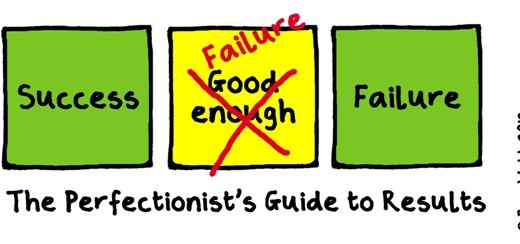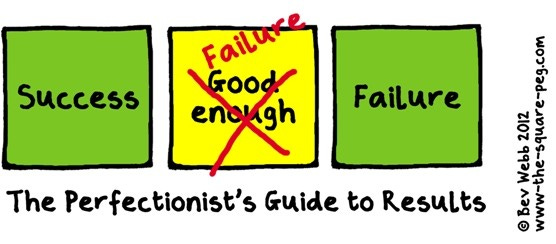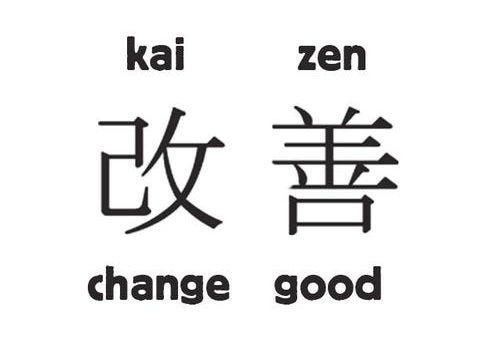Aiming for Perfection? Why "Good Enough for Now" is Better
You’ve decided to make a career transition. Maybe you’ve left your job, or you’re contemplating a big shift - and now, the pressure is on. You feel like you need to find a new-and-improved role, update your professional brand, craft a balanced routine… immediately.
Sound familiar?
Many of us fall into a Perfectionism Trap when we’re in transition. Instead of allowing ourselves time and space to explore, we try to leap from uncertainty straight into a fully-formed, flawless new life. Of course, there’s no such thing as a problem-free existence. But on top of that: trying to arrive at our final destination without knowing what that looks like, is not realistic (as much as we try to convince ourselves otherwise). Without adequate information to make informed decisions, we can end up procrastinating, overwhelmed or stuck in choice paralysis. When we inevitably don’t meet our unrealistic expectations, it can lead to stress, self-doubt and a feeling of failure.
Instead of aiming for perfect, what if we aimed for good enough for now?
Good Enough for Now: A Smarter Approach to Change
Bill Burnett and Dave Evans, authors of Designing Your Life, introduced the idea of “good enough for now.” It’s a simple but powerful concept: rather than fixating on finding the perfect job or path, we take small, intentional steps toward something that feels good enough in the moment.
This doesn’t mean settling for a subpar situation. It means reducing the pressure to get everything right up front, allowing room for iteration. Each step provides feedback and insights, helping refine what aligns with our values, passions and strengths.
Perhaps you dream of starting your own company but are struggling financially. You consider taking a full-time job in the industry of your future startup. For an aspiring entrepreneur, accepting a salaried role can feel like a step backward. However, embracing a "good enough for now" mindset allows you to see it as a strategic move toward your ultimate goal. The experience, industry insights and connections you gain will give you a clearer vision of your next steps.
One Step at a Time: The Wisdom of Lao Tzu
Philosophers and thinkers throughout history have echoed this idea of gradual progress. Lao Tzu, the venerable Chinese philosopher, famously said, "A journey of a thousand miles begins with a single step." Even back then, the ancients knew that major transitions don’t happen overnight, and they certainly don’t happen in one giant leap.
Instead of searching for the ultimate career move, focus on the next logical step. Ask yourself: What’s one thing I can do today to move forward? That might be attending a networking event in a new field; reflecting on what excites you; or asking friends to introduce you to people that might have similar interests. Small actions accumulate over time, and clarity emerges through movement, not from endless overthinking.
The Power of Kaizen: Small, Continuous Improvement
The Japanese concept of kaizen reinforces this incremental approach. Kaizen means "continuous improvement"— the idea that small, consistent actions lead to long-term success. This method has transformed businesses and industries, but it applies equally well to an individual’s personal growth.
Rather than seeking overnight transformation, kaizen encourages daily, minor improvements. Instead of expecting a brand-new career identity overnight, consider dedicating just 15 minutes a day to learning about your intended new field, journalling, or experimenting with your ideas. Small steps like these feel manageable and add up in profound ways over time.
Final Thought: Progress Over Perfection
It’s tempting to want all the answers right now: to know exactly where you’re heading and to make the perfect choices every step of the way. But career transitions—like all meaningful changes—don’t work that way. Instead of aiming for a flawless, fully-formed plan, try embracing good enough for now. Move forward step by step, make small adjustments and trust that clarity and fulfillment will come with action.
Reflection:
What is possible in your career transition if you aimed for ‘good enough for now’ instead of ‘perfect’?
What would ‘good enough for now’ look like? What’s one small step you can take towards that?






